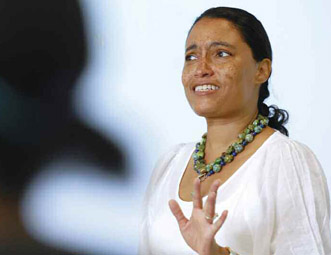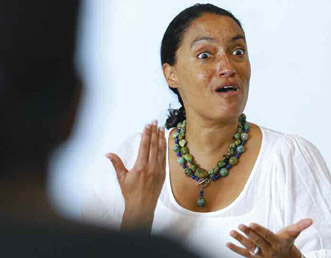 Neuroscience / The Human Brain
Neuroscience / The Human Brain
For today’s lecture on The Human Brain, Professor Nicole Weekes is focusing on the prefrontal cortex and what happens to higher level cognitive functioning when it is damaged. She also talks about the age-old debate between Cartesian dualists, who argue that the mind is a non-biological entity that determines our personalities and defines our humanness, and monists, who assert that the mind and body are one. “Witness the prefrontal lobe,” says Weekes in this abridged and adapted snippet of discussion, “and you’ll find the answers.”
WEEKES: Dualists and monists don’t disagree about how we move around; dualists and monists don’t disagree about how we take in sensory information. What they disagree about is how we start to integrate that sensory information higher and higher up in the system. When you get up that level of functioning, dualists argue there has to be something else. Conscious awareness requires more than just the meat on top of your neck. It has to be immaterial. It can’t just be the structure of the brain.
BRIAN: What do the dualists say about the monkey who learned sign language? That’s pretty high-level cognitive functioning.

WEEKES: I don’t know that much about that particular study but I think there was some debate about whether the monkey was signing at the level of creativity and complexity that you would see in humans or whether it was just mimicking humans. It’s a good question. Maybe dualists would say that monkey has a little bit of spirit. We know that lower-level animals are capable of some level of cognitive functioning. But what about personality? What is it that makes us human and what is it that makes us so different from one another?
A number of researchers have done studies looking at people with brain damage. In 1923, Feuchtwanger studied 200 individuals who had frontal lobe gunshot wounds and 200 with non-frontal lobe gunshot wounds. One of the interesting points he made was that, unlike individuals with non-frontal lobe damage to the cortex, those with damage actually showed less deficit in intellectual function—basic motor and sensory and even in basic memory and language functions that we think of as being higher-level cognitive functioning. Frontal lobe-damaged individuals had far fewer of those deficits.
What was fascinating, even back in 1923, is we had some understanding that the frontal cortex seemed to affect more dramatically people’s attitudes, their moral functioning, even people’s personality. I can’t think of higher-level functioning than that.

If you have damage to the most anterior parts of the brain, you’re going to have problems making those decisions you usually can make. “That looks fun, but maybe that’s dangerous,” or “that looks fun, but I have an exam in three weeks.” That’s what your prefrontal cortex gives you, the ability to say, “No, thank you; I think I’ll just pass on this.” As my father used to say when I was about 16, and he would let me free for a couple of hours, “I just want to say this to you, Nicole. I want you to use your better judgment, not the judgment you usually use.” It’s because he was hoping my prefrontal cortex would develop faster than most people’s do.
ASHA: Is that why they want to raise the age for teen drivers?
WEEKES: Yes, there is no reason why teenagers should be able to drive until they’re 27 [laughter]. Because it isn’t until your mid 20s that you fully have developed and refined your prefrontal cortex. The sad part is you get about 15 years before it starts to die off, at about 40.
Another interesting thing about the frontal cortex is that it is very well connected, so just about every other area of the brain connects up the frontal lobe and that’s both in terms of external and sensory information and internal limbic information. So, that frontal cortex is getting a lot of information from your sensory cortices behind it; visual information, auditory information from the—
MELANIE: Temporal lobe.
WEEKES: The types of deficits you see following damage are partly dependent on what part of the frontal lobe we’re talking about. You can imagine that there is going to be heterogeneity in the symptoms that result from damage to different parts of the frontal cortex. If everyone is talking to the frontal cortex, presumably it has a role in all sorts of functions.
You can think about the complexity of these functions and we can talk about the fact that the frontal cortex is so connected to other parts of the brain and how the pathways from other parts of the brain and back again may be responsible for giving rise to this level of complexity.
Neuroscientists have also made the argument that dualists assume the brains of humans are the same as the brains of other beasts. Maybe the brains of a beast can’t do these higher-level functions. Humans don’t have the brains of the beasts; humans have evolved to have more complex tissue, particularly witnessed in the complexity of the prefrontal cortex.
And that the higher level of structure, mostly of the prefrontal cortex, is capable of higher-level functioning. You don’t need a spirit, you don’t need a soul in order to explain why you have personality, why you make the decisions you do. No, you just need part of the frontal lobe called the prefrontal cortex.
SIDEBAR:
The Professor
On Pomona’s faculty since 1998, Professor of Neuroscience Nicole Weekes is a graduate of Boston University, and she received her M.A. and Ph.D. from UCLA. Her research interests include the effects of biological sex, stress and hormone levels, hemispheric specialization and memory functioning. A three-time recipient of the Wig Distinguished Professor Award for Excellence in Teaching, Weekes also has received the Emerging Black Scholars Award.
The Class
Co-taught by Weekes and Richard Lewis, professor of psychology and neuroscience, The Human Brain is an advanced laboratory course on the relationships between structure and function that exist in the human nervous system. Topics include sensation and perception, cognition and emotion, movement, regulatory systems and social behavior.
Reading List
Neuroscience: Exploring the Brain (3rd ed.) by Mark F. Bear, Barry W. Connors and Michael A. Pardiso
Cognitive Neuroscience: The Biology of the Mind (2nd ed.) by Michael S. Gazzaniga and Richard B. Ivry, George R. Mangun
Fundamentals of Human Neuropsychology (6th ed.) by Bryan Kolb and Ian Q. Whishaw
